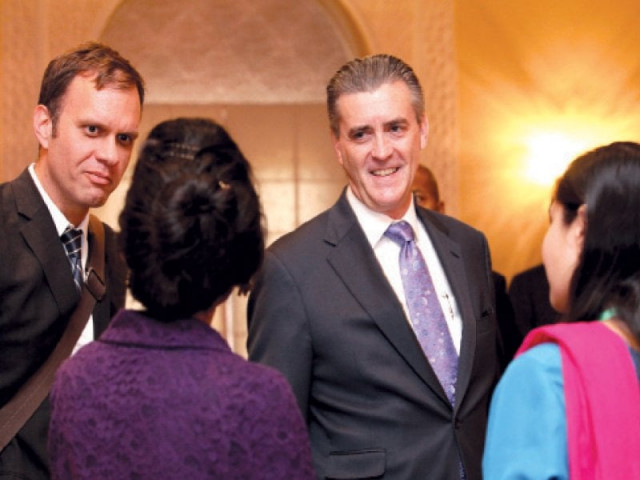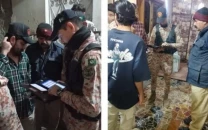Unlocking every person’s potential is one of our top priorities: Olson
“Your country needs you. Devote your time and energy to making Pakistan the country you want it to be,” says Olson.

The ambassador talks to two students during the event. PHOTO: EXPRESS
Education is the key for Pakistanis to improve their skills, compete in the global marketplace and build a stronger country. This was said by US Ambassador Richard Olson at the first-ever reunion of the Study of the US Institute (SUSI) exchange programme here on Friday.
Around 30 Pakistani undergraduate students from a variety of areas and backgrounds travel to the US every year under the SUSI programme, said Laura Pyeatt Brown, assistant cultural attaché of the US Embassy in Pakistan.
The students spend six-weeks at a US university. The first four weeks are academic-based, after which the students travel to cities near the university they visit during the last two weeks of the programme, Brown said.
Olson promised support to the alumni gathered at the reunion. He encouraged them to engage with the alumni network and remain committed to working for their communities.
“Your country needs you. Devote your time and energy to making Pakistan the country you want it to be,” he said. “While the challenges you face may be large, we will continue to support you as you do even greater things in the future.”
Olson said the US is helping Pakistan in the field of education by establishing accredited degree programmes for teachers, rehabilitating school buildings, creating research centres with the help of US-Pakistan university collaborations, and increasing access to higher education through scholarships.
“Unlocking every person’s full potential with quality education is one of our top assistance priorities,” Ambassador Olson said. “This is because education is the key for future prosperity and economic growth.”
Hina Sabeen Khan, an undergraduate student of development studies at Islamabad’s Bahria University, went on the exchange programme in 2012. Khan said the best part of her US experience was the negation of American stereotypes prevalent in Pakistani society.
“We have this stereotype that Americans are against Muslims or that they think all Muslims are terrorists,” She said. “Instead the Americans were very open and friendly, and I found that American and Pakistani students share more similarities than differences.”
Qazi Fahad Ahmed, who was an engineering student at the Mehran University in Jamshoro, said that when he went on the SUSI programme in 2010, he learnt the skills for effective community service.
On his return to Pakistan, he used those skills to help with relief work in the 2010 and 2011 floods.
Syed Ali Danyal, who now works for a marketing firm, was a student at the Lahore School of Economics in 2010 when he went on the exchange trip.
I did not know the other Pakistani students before I met them for the programme. But since then, we have forged strong friendships, Daniyal said.
“We are constantly in touch with each other as well as our American friends whom we met through the exchange programme,” he added.
Around three dozen students attended the first day of the reunion on Friday. They discussed their experiences in the US and made plans to develop service projects in their hometowns. The reunion will conclude on Saturday with research presentations and discussion sessions planned during the day.
Published in The Express Tribune, January 19th, 2013.



















COMMENTS
Comments are moderated and generally will be posted if they are on-topic and not abusive.
For more information, please see our Comments FAQ